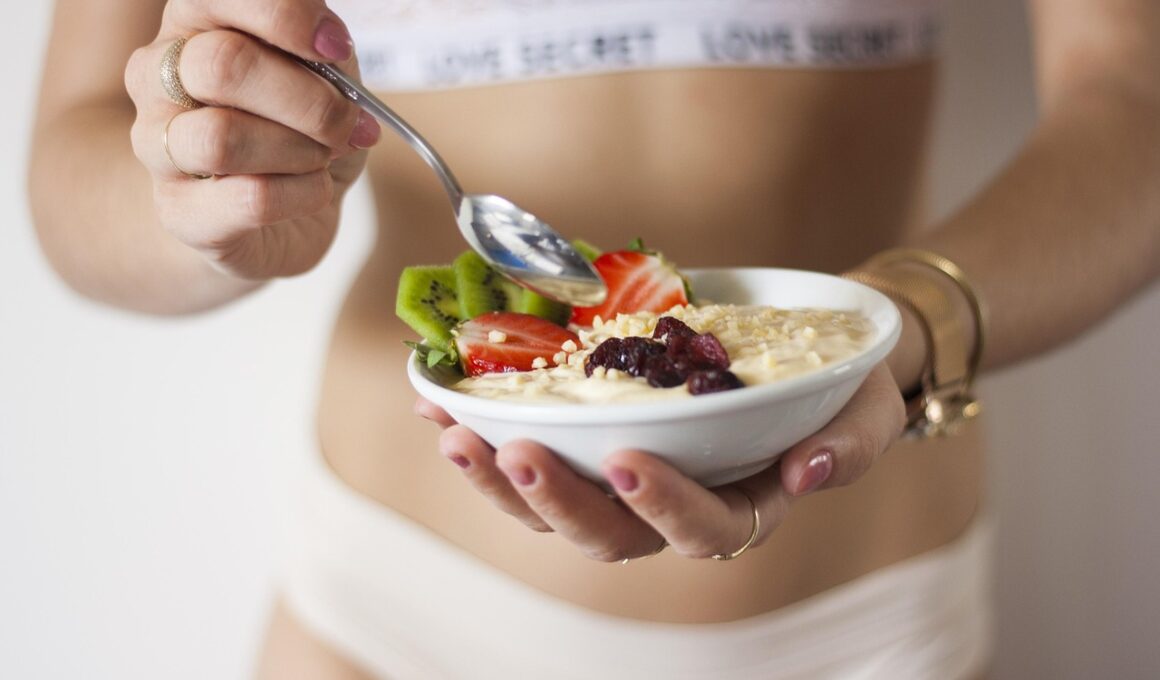Balancing Macronutrients for Pre-Event Meals
Pre-event nutrition plays a crucial role in the performance of athletes. A balanced meal that includes macronutrients is essential for optimal energy levels. Athletes should focus on incorporating carbohydrates, proteins, and healthy fats to maximize their preparations before the event starts. Carbohydrates serve as the main energy source, offering readily available glucose for the muscles. Foods rich in carbs include whole grains, fruits, and starchy vegetables. Proteins are required for muscle recovery and repair, thus athletes should consume lean meats, dairy, or plant-based options. Healthy fats, found in avocados, nuts, and olive oil, should also be included, albeit in smaller quantities. It is advisable to consume a meal 3 to 4 hours before an event, allowing ample time for digestion. Following this schedule helps prevent gastrointestinal issues during the competition. Including hydration and electrolytes is equally essential as it supports performance and delays fatigue. Therefore, balance in macronutrient intake ensures that athletes achieve peak performance, maintaining endurance and strength throughout their events. Remember, planning your meals effectively will make a significant difference during sports performance.
Understanding Macronutrients
Macronutrients, including carbohydrates, proteins, and fats, each play a unique role in an athlete’s diet. Carbohydrates are vital as the primary energy source, particularly in the form of glycemic carbs for quick energy release. They replenish glycogen stores in muscles, crucial for endurance sports. Proteins, on the other hand, are essential for muscle repair and growth. They help rebuild muscle tissues after intense workouts. Lean meats, fish, dairy products, and legumes provide the protein needed for recovery. Understanding your body’s specific requirement concerning macronutrient distribution is fundamental, as it varies based on the sport’s intensity and duration. Incorporating the right proportions ensures balanced nutrition that caters to an athlete’s unique demands. Healthy fats, often overlooked, offer a concentrated energy source and support cellular function. Athletes should focus on unsaturated fats, which help reduce inflammation. Choosing the right combination of these macronutrients allows athletes to find the optimal diet to fuel their performance. Consulting with a sports nutritionist can assist in customizing meal plans to better align with individual goals or training cycles, improving overall results on event day.
Timing is crucial when it comes to pre-event nutrition. Eating well before the event helps to avoid nausea or discomfort that can arise from eating too close to event time. The ideal is to eat foods that will be digested well before physical exertion commences. As a general guideline, meals should be consumed about three to four hours before an event. This allows enough time for the body to digest the food, convert it into energy, and use fats and carbohydrates effectively. Closer to the event, about an hour before, a light snack of carbs can keep energy levels steady without causing digestive issues. Foods such as bananas, energy bars, and sports gels can provide a quick source of energy. It’s also essential to consider hydration. Dehydrated athletes may face decreased performance due to dips in energy levels or muscle cramps. Thus, maintaining proper hydration levels entails drinking adequate water before and during the event. Ultimately, the right timing combined with the appropriate macronutrient balance can amplify performance through enhanced energy reserves and overall physical readiness.
Sample Pre-Event Meal
A successful pre-event meal could look like a combination of whole-grain pasta with grilled chicken, accompanied by a side of steamed broccoli. This meal balances carbohydrates, proteins, and healthy fats efficiently. Whole grain pasta serves as a major carbohydrate source, providing sustained energy through complex carbohydrates. Grilled chicken is an excellent protein option that will contribute to muscle preservation and recovery without causing excessive bulk. Steamed broccoli adds important micronutrients and fiber, promoting digestive health. Another ideal pre-event meal might include brown rice, fish, and a variety of colorful vegetables. In this scenario, brown rice will add more carbohydrates while fish provides omega-3 fatty acids which help with inflammation. This combination will fuel muscles effectively while supporting performance attributes required for athletic success. It’s also important to consider seasoning, with herbs instead of heavy sauces that may cause digestive issues. Personalizing pre-event meals according to your taste preferences can enhance overall adherence and enjoyment. Preparing meals in advance can help eliminate last-minute rushing and anxiety, contributing to a clearer focus and better performance.
Many athletes underestimate the importance of hydration alongside their macronutrient considerations. Staying hydrated ensures optimal physiological functions, including temperature regulation, nutrient transportation, and muscle contraction. Adequate hydration should begin well before the event day, with attention to fluid intake throughout the athlete’s training regimen. Water is typically sufficient for hydration, but incorporating electrolyte drinks can further enhance performance by replenishing lost salts. Consume about 500ml of water 1-2 hours before the event to maintain hydration levels. Avoid alcoholic beverages or excessive caffeine, as they can dehydrate the body and negatively impact performance. Testing hydration status can display either clear or light yellow urine, indicating proper hydration. Along with fluid intake, an electrolyte source can prevent cramps and support tips vital for endurance performances. Constantly monitoring fluid intake assists in understanding personal hydration needs while competing. Adopting a proactive approach to hydration promotes enhanced performance during events. Special consideration is also given to weather factors, such as competing in heat or altitude. Therefore, hydrating effectively can significantly impact an athlete’s ability to achieve their goals during the event.
Avoiding Common Pre-Event Mistakes
A big part of succeeding in pre-event nutrition is avoiding common mistakes that would hamper performance. One such error is skipping meals before the event, which can lead to low energy levels and poor performance outcomes. Another mistake is trying new foods on the day of the competition. Switching up the routine can lead to unforeseen digestive distress or allergies. It is essential to stick to familiar foods and meals that have already been tested during training. Eating heavy foods right before the event can also lead to sluggishness, which can affect agility and speed. Instead, focus on lighter meals to allow for better digestion. Lastly, not accounting for personal preferences, intolerances, or allergies can throw off a nutrition plan entirely. Listen to your body’s signals and plan meals accordingly. Balancing macronutrients effectively while steering clear of common pitfalls ensures athletes can maintain high performance. Preparing and testing meal plans ahead of time will set athletes on a path to better outcomes on event day.
As athletes prepare for events, the impact of pre-event nutrition cannot be underestimated. Planning meals that incorporate balanced macronutrients enables athletes to enhance their performance and overall readiness. Carbohydrates, proteins, and fats play unique roles, supporting energy, recovery, and overall health. As the competition draws near, attention to timing and hydration solidifies a successful pre-event strategy, which blends all elements effectively. Avoiding last-minute dietary changes, testing meals and snacks, and addressing hydration needs can positively contribute to an athlete’s performance level. Utilizing these tips will ensure athletes maximize their potential while minimizing obstacles during competition. Ultimately, a tailored approach to pre-event nutrition will assist athletes in achieving their personal bests. Recovery and preparation do not end with meal choices but rather extend to developing a holistic understanding of nutrition. Knowledge combined with practical implementation can further enhance outcomes at events. Athletes are encouraged to document their experiences with food choices and performance outputs to refine their routines. In summary, balanced pre-event meals can set athletes on the right path to achieving their goals, ensuring optimal physical performance and mental focus.
Utilizing the information about macronutrients and pre-event meals can empower athletes in both training and competition settings. Education is key for athletes eager to improve their performance through effective nutrition. Accessing resources such as sports nutritionists, online articles, and possibly local workshops can impart wisdom on nutrition requirements and balance. Regular evaluations of dietary habits combined with practical approaches—such as maintaining food diaries—can highlight areas for change or improvement. Athletes should engage in self-reflection regarding their energy levels or reactions to specific foods during training and events. Over time, this practice delivers insights into what works best for them. The dynamic nature of performance nutrition requires continued learning and adapting. Each athlete might have distinct sensitivities or preferences, thus creating the need for individualized meal planning. Consequently, successful pre-event nutrition is not a one-size-fits-all solution. By concentrating on balanced macronutrients, adequate hydration, and optimal meal timing, athletes can significantly bolster their performance. Collaborating with other like-minded athletes can foster a supportive environment focused on shared goals—landing a successful performance seat will certainly be rewarding in sports and overall well-being.


